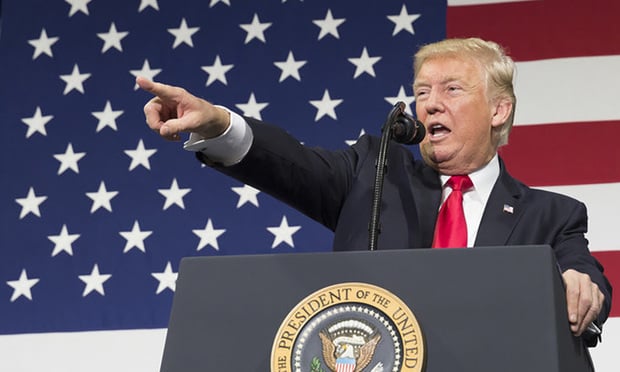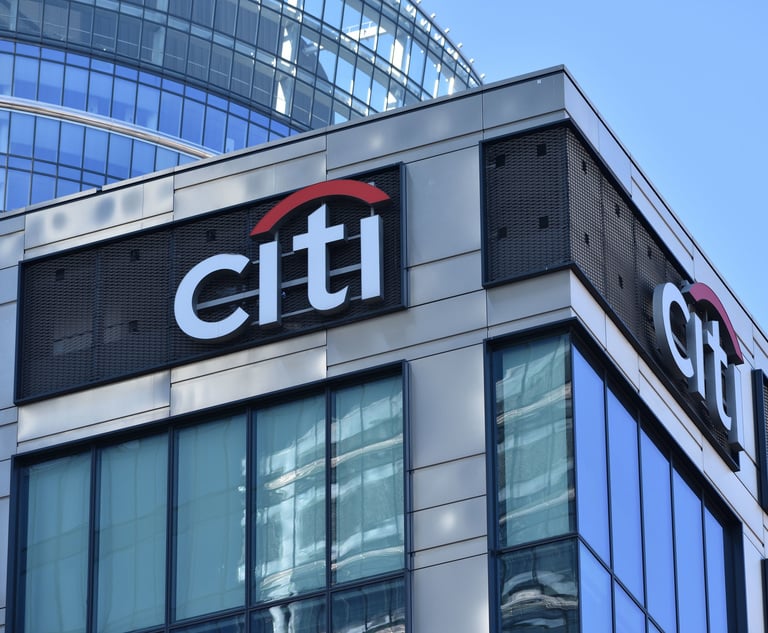Trump's Statements Focused On, Propelling DACA Suit Forward
U.S. District Judge Nicholas Garaufis found that Trump's disparaging statement's during the campaign were enough to justify proceeding under an equal protection claim.
March 29, 2018 at 04:50 PM
4 minute read
 President Donald Trump
President Donald Trump A suit in New York over the Trump administration's decision to wind down the Obama-era Deferred Action for Childhood Arrivals immigration policy will proceed after the Brooklyn federal judge overseeing a pair of overlapping suits declined on Thursday to grant the Justice Department's request to dismiss the claims.
On the most substantial portion of the allegations—that the decision to shutter the program was arbitrary and capricious under the Administrative Procedure Act and motivated by discriminatory animus, in violation of the Constitution—U.S. District Judge Nicholas Garaufis of the Eastern District of New York found the plaintiffs had raised sufficient facts to allow the suits to go forward.
Garaufis did provide the Trump administration some relief. He narrowed the claims raised by the plaintiffs, one a private individual joined by immigrant defense organizations in one suit and the other a number of state plaintiffs led by New York's attorney general in another. The court found claims that the rescission decision should be seen as a legislative rule, rather than a statement of policy, and thus a violation of the Administrative Procedure Act, unavailing.
Garaufis also dismissed claims over the Department of Homeland Security's policy regarding the collection of personal information from DACA recipients because the department said it wasn't using the information to deport participants. But it left the door open for action if facts can be shown to the contrary.
As with numerous other suits against the Trump administration, the president's public statements, specifically disparaging Latinos and Mexicans on the campaign trail, were put front and center in the court's justification for the suit going forward.
According to the judge, Trump's statements during the campaign represent “allegations … sufficiently racially charged, recurring, and troubling as to raise a plausible inference that the decision to end the DACA program was substantially motivated by discriminatory animus.”
Garaufis acknowledged that looking at Trump's prior statements as proof of his later actions did represent a “fraught” issue, noting that “[o]ld statements may say little about what lay behind a later decision.”
Additionally, he found that an equal protection claim brought against the president raises “difficult questions” about whether, and for how long, an executive action “disproportionately affecting a group the president has slandered” can be considered “constitutionally suspect.”
Yet, Garaufis reasoned, “The court does not see why it must or should bury its head in the sand when faced with overt expressions of prejudice.” It was reasonable to infer, he said, that a candidate who makes bigoted statements on the campaign trail is likely to take bigoted action when in office.
Garaufis also dismissed the “remarkable argument” put forward by the DOJ that the president can't be liable for the DACA rescission because it was actually an appointee—this case, the secretary of the Department of Homeland Security—who ultimately makes the call on policy. Other “more mundane contexts” had produced case law putting the liability for discrimination on a “biased individual [who] manipulates a non-biased decision-maker into taking discriminatory action,” he noted.
A spokesperson for the DOJ did not respond to a request for comment.
In a statement, New York Attorney General Eric Schneiderman's spokeswoman Amy Spitalnick said the office was pleased with Garaufis' decision.
“[W]e look forward to continuing our litigation to protect Dreamers and New York's businesses, economy and institutions,” she said.
Spokespeople for the Batalla Vidal plaintiffs did not respond to a request for comment.
The U.S. Court of Appeals for the Second Circuit still has a number of claims generated by litigation in the district pending.
This content has been archived. It is available through our partners, LexisNexis® and Bloomberg Law.
To view this content, please continue to their sites.
Not a Lexis Subscriber?
Subscribe Now
Not a Bloomberg Law Subscriber?
Subscribe Now
NOT FOR REPRINT
© 2025 ALM Global, LLC, All Rights Reserved. Request academic re-use from www.copyright.com. All other uses, submit a request to [email protected]. For more information visit Asset & Logo Licensing.
You Might Like
View All
New York-Based Skadden Team Joins White & Case Group in Mexico City for Citigroup Demerger

Bankruptcy Judge Clears Path for Recovery in High-Profile Crypto Failure
3 minute read
US Judge Dismisses Lawsuit Brought Under NYC Gender Violence Law, Ruling Claims Barred Under State Measure
Trending Stories
- 1Doug Emhoff, Husband of Former VP Harris, Lands at Willkie
- 2LexisNexis Announces Public Availability of Personalized AI Assistant Protégé
- 3Some Thoughts on What It Takes to Connect With Millennial Jurors
- 4Artificial Wisdom or Automated Folly? Practical Considerations for Arbitration Practitioners to Address the AI Conundrum
- 5The New Global M&A Kings All Have Something in Common
Who Got The Work
J. Brugh Lower of Gibbons has entered an appearance for industrial equipment supplier Devco Corporation in a pending trademark infringement lawsuit. The suit, accusing the defendant of selling knock-off Graco products, was filed Dec. 18 in New Jersey District Court by Rivkin Radler on behalf of Graco Inc. and Graco Minnesota. The case, assigned to U.S. District Judge Zahid N. Quraishi, is 3:24-cv-11294, Graco Inc. et al v. Devco Corporation.
Who Got The Work
Rebecca Maller-Stein and Kent A. Yalowitz of Arnold & Porter Kaye Scholer have entered their appearances for Hanaco Venture Capital and its executives, Lior Prosor and David Frankel, in a pending securities lawsuit. The action, filed on Dec. 24 in New York Southern District Court by Zell, Aron & Co. on behalf of Goldeneye Advisors, accuses the defendants of negligently and fraudulently managing the plaintiff's $1 million investment. The case, assigned to U.S. District Judge Vernon S. Broderick, is 1:24-cv-09918, Goldeneye Advisors, LLC v. Hanaco Venture Capital, Ltd. et al.
Who Got The Work
Attorneys from A&O Shearman has stepped in as defense counsel for Toronto-Dominion Bank and other defendants in a pending securities class action. The suit, filed Dec. 11 in New York Southern District Court by Bleichmar Fonti & Auld, accuses the defendants of concealing the bank's 'pervasive' deficiencies in regards to its compliance with the Bank Secrecy Act and the quality of its anti-money laundering controls. The case, assigned to U.S. District Judge Arun Subramanian, is 1:24-cv-09445, Gonzalez v. The Toronto-Dominion Bank et al.
Who Got The Work
Crown Castle International, a Pennsylvania company providing shared communications infrastructure, has turned to Luke D. Wolf of Gordon Rees Scully Mansukhani to fend off a pending breach-of-contract lawsuit. The court action, filed Nov. 25 in Michigan Eastern District Court by Hooper Hathaway PC on behalf of The Town Residences LLC, accuses Crown Castle of failing to transfer approximately $30,000 in utility payments from T-Mobile in breach of a roof-top lease and assignment agreement. The case, assigned to U.S. District Judge Susan K. Declercq, is 2:24-cv-13131, The Town Residences LLC v. T-Mobile US, Inc. et al.
Who Got The Work
Wilfred P. Coronato and Daniel M. Schwartz of McCarter & English have stepped in as defense counsel to Electrolux Home Products Inc. in a pending product liability lawsuit. The court action, filed Nov. 26 in New York Eastern District Court by Poulos Lopiccolo PC and Nagel Rice LLP on behalf of David Stern, alleges that the defendant's refrigerators’ drawers and shelving repeatedly break and fall apart within months after purchase. The case, assigned to U.S. District Judge Joan M. Azrack, is 2:24-cv-08204, Stern v. Electrolux Home Products, Inc.
Featured Firms
Law Offices of Gary Martin Hays & Associates, P.C.
(470) 294-1674
Law Offices of Mark E. Salomone
(857) 444-6468
Smith & Hassler
(713) 739-1250







